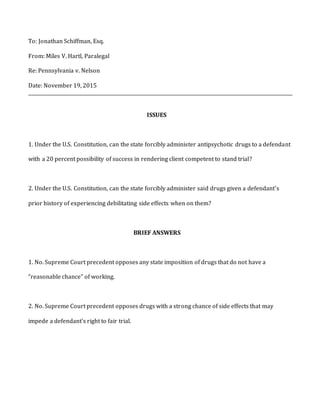
Nelson Memorandum
- 1. To: Jonathan Schiffman, Esq. From: Miles V. Hartl, Paralegal Re: Pennsylvania v. Nelson Date: November 19, 2015 _________________________________________________________________________________________________________________ ISSUES 1. Under the U.S. Constitution, can the state forcibly administer antipsychotic drugs to a defendant with a 20 percent possibility of success in rendering client competent to stand trial? 2. Under the U.S. Constitution, can the state forcibly administer said drugs given a defendant’s prior history of experiencing debilitating side effects when on them? BRIEF ANSWERS 1. No. Supreme Court precedent opposes any state imposition of drugs that do not have a “reasonable chance” of working. 2. No. Supreme Court precedent opposes drugs with a strong chance of side effects that may impede a defendant’s right to fair trial.
- 2. FACTS Our client, Jason Nelson (“Nelson”), was recently charged by the State of Pennsylvania with manslaughter. The charge arose out of the following incident. After escaping on foot from Norristown State Hospital’s mental institution at 8:20 p.m. on September 14, 2015, Nelson was spotted by Mr. Jason Armstrong (“Armstrong”), who was legally carrying a firearm. Armstrong confronted Nelson, and Armstrong subsequently attempted to subdue Nelson. In the ensuing struggle, Nelson successfully located Armstrong’s firearm and shot Armstrong twice through the chest at approximately 8:26 p.m. Nelson was quickly apprehended by city authorities. Armstrong was rushed to Norristown Hospital’s intensive care unit, where he was pronounced dead at 11:03 p.m., September 14, 2015. Nelson was subsequently charged with manslaughter and returned to the Norristown State Hospital mental institution awaiting trial. The state prosecutor has requested that a combination of Risperidone and Depakote be administered to Nelson. Nelson is vehemently opposed to receiving said drugs because he has suffered significant and debilitating side effects, including drowsiness, lethargy, and confusion, when he took them in the past. Furthermore, medical experts have concluded that Nelson has an approximately 20 percent chance of being rendered competent if he receives the medication the state intends to administer. DISCUSSION Involuntary Administration of Medication In Sell v. United States, 539 U.S. 166 (2003), the defendant, Charles Thomas Sell, was a dentist who filed fictitious insurance claims and was convicted on several counts of health care
- 3. fraud. While he was not deemed a danger to himself or others due to a “delusional disorder,” a trial court found that he would not be competent to stand trial in the absence of antipsychotic medication. The Supreme Court ruled that antipsychotic medication may be administered “only if the treatment is medically appropriate, is substantially unlikely to have side effects that may undermine the fairness of the trial and, taking account of less intrusive alternatives, is necessary significantly to further important governmental trial-related trial interests.” This confers with the previous ruling of Washington v. Harper, 494 U.S. 210 (1990), where involuntary medication was upheld in the event that an individual represents a danger to their self and society and little dispute exists over the efficacy of medical treatment. Given Nelson’s charges, the medical “appropriateness” of involuntary medication in the case at bar hinges on the odds of its success in clearing his symptoms. Two cases provide reasonable guidelines. In United States v. Gomes, 387 F.3d 157, 160 (2nd Cir. 2004), the Second Circuit and Supreme Court approved the administration of anti-psychotic medication only if it was “likely to restore the defendant to competency.” In the case of defendant Aaron Gomes, expert testimony determined a 70 percent chance of success and medication was administered. The lower limits of “likelihood” were tested in United States v. Ghane, 392 F.3d 317 (8th Cir. 2004), where the testimony of four psychiatrists indicated that defendant Hessam S. Ghane stood a 5 to 10 percent chance of recovery from debilitating symptoms. In light of these limited odds, the Court ruled against the involuntary administration of antipsychotic drugs. Given that Nelson’s odds of successful treatment are a mere 10 percent higher than those considered in Ghane (and a full 50 percentage points lower than those approved in Gomes), they are reasonably defined as a limited chance of success. Nelson therefore reserves the right to refuse involuntary medication on these grounds alone.
- 4. Furthermore, Nelson’s prior history of experiencing severe drowsiness, lethargy, and confusion while on said medication further diminishes his capacity to undergo a fair hearing and understand his circumstances. Even assuming successful alleviation of the worst of Nelson’s psychosis, the likelihood of debilitating side effects remains strong. Individual circumstances, in addition to broad legal principles, bolster Nelson’s right to refuse medication. Washington v Harper Rebuttal The prosecution has cited Harper in support of Mr. Nelson’s involuntary medication. It argues that Harper permits medicating those who “represent a significant danger to themselves or others,” and that, given the nature of Nelson’s struggle with Armstrong, Nelson falls into this classification. However, this argument is not applicable as Nelson’s competency to stand trial, and not “danger to…others,” is at issue. Furthermore, the prosecution fails to mention that their source only supports this condition in the event that there is “little dispute in the psychiatric profession that the proper use of the drugs is an effective means of treating and controlling a mental illness likely to cause violent behavior.” Nelson’s situation fails to meet this condition, for reasons expanded upon and outlined in Ghane, and Gomes, supra. Given a 20 percent chance of success with the strong possibility of severe side effects, involuntary medication does not stand as an “effective” solution in these circumstances. CONCLUSION Because the chance of rendering Nelson competent to stand trial through involuntary medication stands at 20 percent, with the possibility of severe lethargy, drowsiness, and confusion as observed in Nelson’s prior consumption of said medication, Nelson may legally refuse the prosecutor’s request forinvoluntary medication.
- 5. Such a course of action promises neither reasonably likely nor reasonably effective results, and a broad call to medicate all who pose a danger to themselves and others does not negate concerns related to medical necessity.